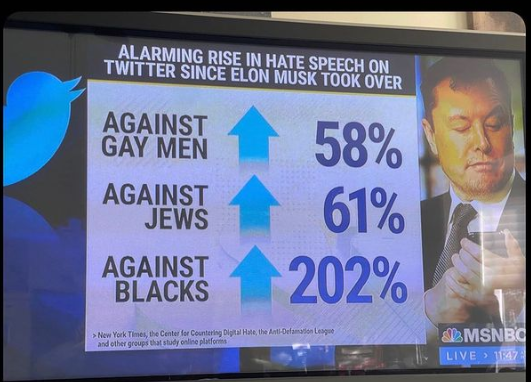SAN FRANCISCO — Before Elon Musk acquired Twitter, Black Americans were slurred 1,282 times daily. After the billionaire became Twitter’s owner, they soared to 3,876 times a day. Slurs against homosexual men emerged on Twitter 2,506 times a day on average when Musk took control. Their daily use increased to 3,964.
New York Times Morning Newsletter Signup
Anti-Defamation League, Center for Countering Digital Hate, and other organizations that monitor online platforms present the most comprehensive picture of how Twitter conversations have evolved since Musk closed his $44 billion buy for the firm in late October. While the numbers are relatively tiny, experts noted the rises were atypically large. Musk’s service improvements go beyond speech. Twitter has reinstated accounts suspended after the U.S. government designated the Islamic State a terror organization. QAnon, a far-right conspiracy theory, has paid for Twitter verification to appear legitimate.
Musk denies Twitter’s rise in hate speech. Last month, he posted a downward-trending graph demonstrating that “hate speech impressions” had plummeted by a third since he took charge. He did not disclose his hate speech metrics. Kanye West, known as Ye, tweeted a swastika inside the Star of David on Thursday, prompting Musk to deactivate his account indefinitely. Musk said Twitter would reveal “hate speech impressions” every week on Friday and agreed with a tweet that hate speech rose last week because of Ye’s antisemitic postings.
Twitter content changes have social and financial effects. As they await Musk’s impact, Twitter’s advertisers, who account for 90% of income, have cut back. Some worry that platform conversations may degrade.
Twitter reassured advertisers that it is committed to online safety on Wednesday. “Brand safety is only feasible when human safety is the primary priority,” the corporation noted in a blog post. “This still holds.” An EU official said Musk and Thierry Breton, the EU’s digital leader, addressed content moderation and regulation during the advertiser pitch. Breton has pressured Musk to follow the Digital Services Act, a European rule that mandates social networks to limit internet damage or face fines and other consequences. The official said Breton would “stress test” Twitter’s content moderation and
misinformation efforts in San Francisco early next year.
Musk may have regulations to deal with harmful speech if that happens, but Twitter may need more staff to moderate. Last month, Musk dismissed, laid off, or resigned more than half of the workforce, including those who removed harassment, foreign influence, and disinformation. Trust and safety chief Yoel Roth resigned.
The Anti-Defamation League, which complaints antisemitic messages to Twitter and tracks which are deleted, claimed the company had dropped from 60% to 30%.
Last month, Yael Eisenstat, a vice president at the Anti-Defamation League, urged Musk that Twitter should allocate resources to its policies. She stated he didn’t seem interested in civil rights and other organizations’ suggestions.
Last month, Meta, which owns Facebook and Instagram, sought to inform Twitter about accounts linked to Russian and Chinese state-backed influence activities, according to two employees of Meta’s security team who requested anonymity. Since foreign influence operations linked bogus Facebook accounts to Twitter, the two firms constantly discussed these concerns. Meta employees said their emails to Twitter colleagues bounced or remained unanswered, suggesting they were sacked.


Add comment